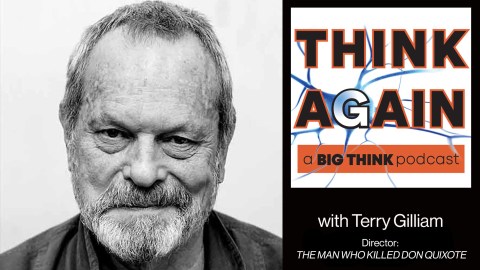Terry Gilliam – The impossible dream

- An American barbarian in Monty Python
- Chaos Muppets vs. Order Muppets (and which one Terry Gilliam is)
- Artistic ego: avoiding the fate of Icarus, Job, etc.
Faith in anything is its own special form of madness. It’s a challenge to entropy, and entropy takes no challenge lightly. If there’s any better metaphor for this struggle than trying to make a big budget movie with even a shred of integrity, I haven’t found it.
On the one hand, you’ve got this impossible dream. This faith in the beautiful thing that’s supposed to emerge at at the end of the process. On the other hand, the process is a hellish sausage-making machine of studio bosses, financing, and acts of god like four days of flash flooding in the middle of your big shoot. You might as well be Don Quixote, doing battle with a windmill.
What kind of masochist would put themselves through that?
My guest today, Terry Gilliam, is that very masochist. And we should be grateful, because his stomach for the fight has given us movies like THE FISHER KING, BRAZIL, 12 MONKEYS and MONTY PYTHON’s THE LIFE OF BRIAN. And now, almost 30 years after his first, biblically disastrous attempt to make it, THE MAN WHO KILLED DON QUIXOTE. Starring Adam Driver and Jonathan Pryce, the movie is as funny, thrilling, and unpretentiously deep as the best of Gilliam’s work. It’s also kind of like one of those Russian matryoshka dolls: a film inside a film inside a film, all of them metaphors for the holy folly of believing in anything at all.
The Man Who Killed Don Quixote is out April 19th in select theaters and on demand video.
Surprise conversation starters in this episode:
Michelle Thaller on whether time is real or an illusion





